I. Introduction
Surrogacy is a beautiful and life-changing journey for both intended parents and the women who choose to become surrogates. Many surrogates find the experience so rewarding that they consider doing it more than once. However, an important question arises: How many times can a woman be a surrogate?
The answer depends on several factors, including medical recommendations, legal regulations, emotional well-being, and practical considerations. In this guide, we will explore the different aspects that influence how many times a woman can safely and ethically serve as a surrogate.
More: Surrogate Eligibility Quiz
II. Medical Guidelines for Multiple Surrogacies
The number of times a woman can safely be a surrogate is primarily determined by her health and medical history. Here are some key medical considerations:
A. Impact of Pregnancy on the Body
Pregnancy puts significant physical strain on the body. The uterus expands, hormones fluctuate, and major organs adjust to accommodate the growing baby. While a healthy woman can safely carry multiple pregnancies, repeated pregnancies may increase the risk of:
- Gestational diabetes
- High blood pressure (preeclampsia)
- Placenta previa or placenta accreta
- C-section complications (for those who have had previous C-sections)
B. General Health Requirements for Surrogacy
Most surrogacy agencies and fertility clinics follow the guidelines set by the American Society for Reproductive Medicine (ASRM), which recommends that surrogates should:
- Have a history of healthy, uncomplicated pregnancies
- Have had no more than five total vaginal deliveries
- Have had no more than three total C-sections
- Have a BMI within the recommended range (typically under 32) (BMI Calculator)
Each additional pregnancy increases certain risks, and doctors carefully evaluate a surrogate’s medical history before approving her for another journey.
C. Recovery Time Between Pregnancies
It is generally recommended that surrogates wait at least 6 to 12 months after giving birth before attempting another surrogacy. This allows the body to heal properly, lowers health risks, and ensures the surrogate is physically and emotionally ready for another pregnancy.
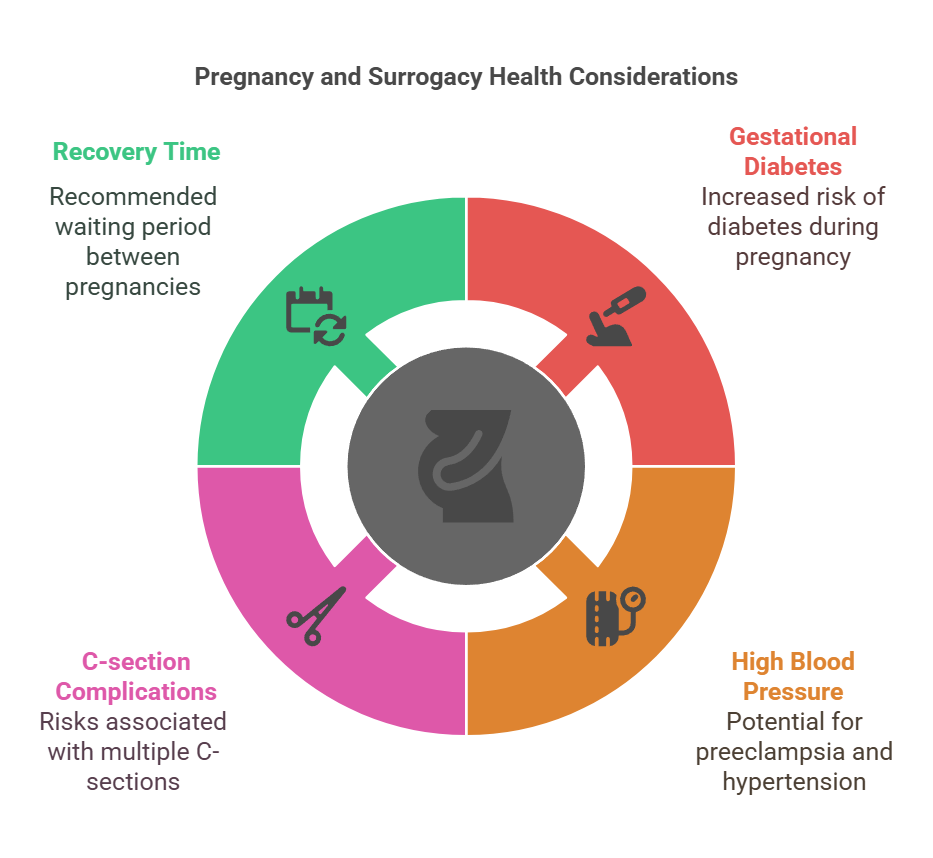
III. Legal and Ethical Considerations
A. Surrogacy Laws and Regulations
Surrogacy laws vary by state and country. Some jurisdictions may have restrictions on how many times a woman can be a surrogate, while others leave it to medical professionals and agencies to decide.
B. Agency Policies on Repeat Surrogates
Most surrogacy agencies allow women to be surrogates multiple times, as long as they meet the health and psychological requirements for each journey. Some agencies even prefer experienced surrogates, as they are already familiar with the process and expectations.
C. Ethical Aspects of Multiple Surrogacies
Ethical considerations come into play when deciding how many times a woman should be a surrogate. These include:
- Ensuring the surrogate is making an informed decision
- Making sure she is not feeling pressured by financial incentives
- Protecting her physical and emotional well-being
Agencies and fertility specialists take these ethical factors seriously and require thorough medical and psychological evaluations before approving repeat surrogates.
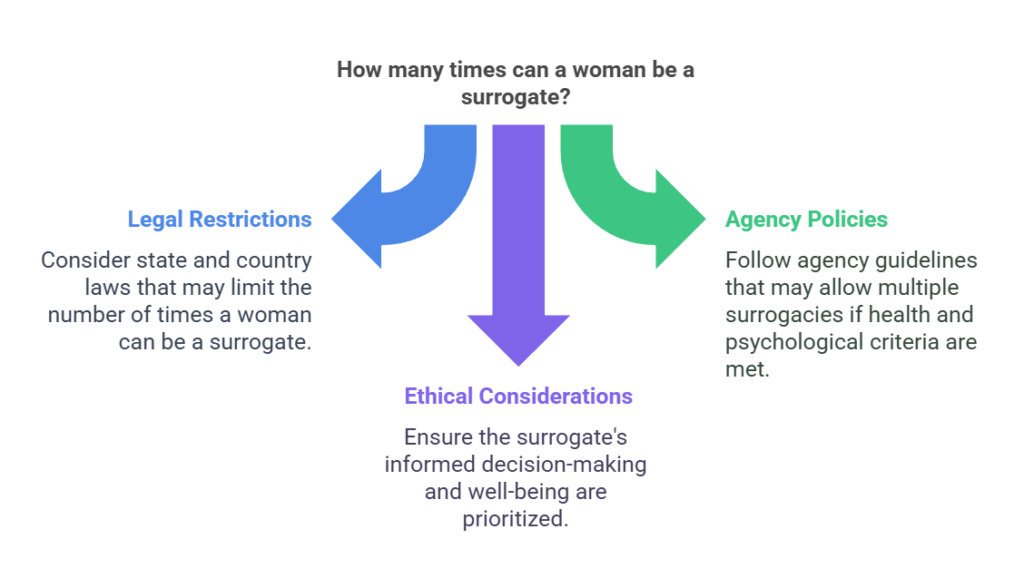
IV. Psychological and Emotional Aspects
While surrogacy can be an incredibly fulfilling experience, it also carries emotional and psychological challenges, especially for repeat surrogates.
A. Emotional Impact of Multiple Surrogacies
Some surrogates find the experience deeply rewarding and are eager to help more families. Others may experience emotional fatigue, especially after multiple pregnancies. Common emotional challenges include:
- Attachment to the baby, even though the child is not biologically theirs
- Feelings of sadness or emptiness after giving birth
- Stress from managing relationships with intended parents and their own families
B. The Role of Psychological Screening
Most surrogacy agencies require surrogates to undergo mental health screenings before each journey. These evaluations assess a surrogate’s emotional readiness and ensure she has a strong support system.
C. Family and Personal Life Considerations
Being a surrogate multiple times means balancing surrogacy with personal responsibilities, including:
- Raising her own children
- Managing work commitments
- Receiving support from a spouse or partner
It is important that a surrogate’s decision to embark on another journey is supported by her family and loved ones.
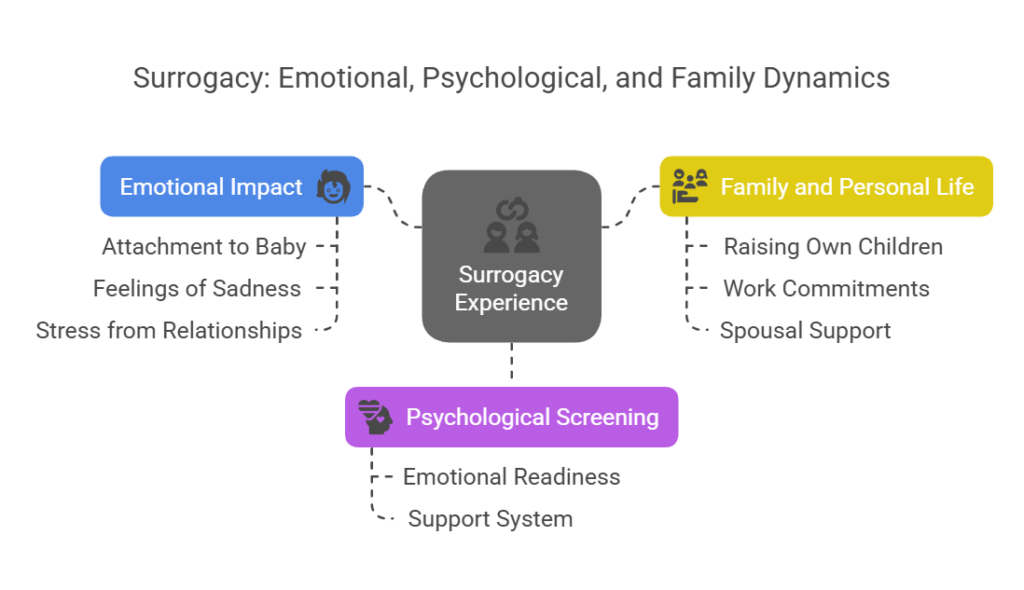
V. Financial and Practical Factors
A. Compensation for Repeat Surrogates
Surrogates receive compensation for their time, effort, and medical expenses. Many agencies offer higher compensation for experienced surrogates because they are already familiar with the process. Compensation typically includes: More(Compensation for Surrogate Mothers: What You Should Know)
- Base pay (which can range from $40,000 to $60,000+)
- Monthly allowances
- Medical and travel expenses
- Bonuses for completing milestones (such as embryo transfer, successful pregnancy, or carrying multiples)
B. Time Commitment and Lifestyle Adjustments
Each surrogacy journey takes 12 to 18 months from start to finish. For women considering multiple surrogacies, this means dedicating several years of their lives to the process.
C. Health Insurance and Medical Coverage
Some surrogates may need additional health insurance coverage for pregnancy-related expenses. Agencies typically ensure all medical costs are covered, but surrogates should always verify the details before committing to another journey.
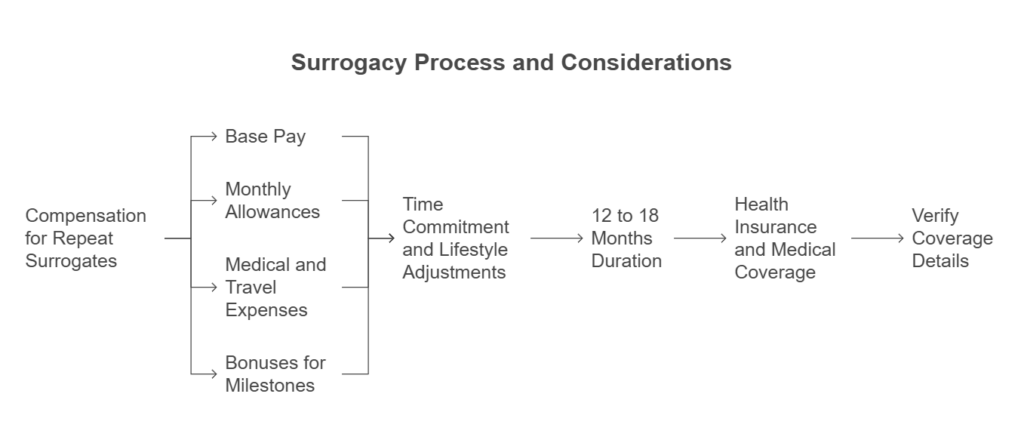
VI. What Experts Say: Doctors and Agencies’ Perspectives
A. Fertility Specialists’ Recommendations
Doctors recommend that a woman stops being a surrogate if:
- She has experienced complications in a previous pregnancy
- She has reached the recommended limit of five vaginal births or three C-sections
- She has had any serious medical conditions
B. Agencies’ Policies on Repeat Surrogates
Most agencies allow women to be surrogates up to three or four times, as long as they remain in good health. Some agencies even offer special incentives to experienced surrogates due to their familiarity with the process.
C. Stories from Repeat Surrogates
Many women have successfully been surrogates multiple times. Here are some real-life examples:
- Sarah, a three-time surrogate: “Each journey was different, but every time I helped a family, it felt like a gift. I stopped after my third surrogacy to focus on my own family.”
- Lisa, a four-time surrogate: “I loved being a surrogate, but after my fourth journey, my doctor advised me to stop for health reasons.”
Hearing from experienced surrogates can help prospective surrogates make informed decisions. More: (Becoming a Surrogate: Is It the Right Choice for You?)
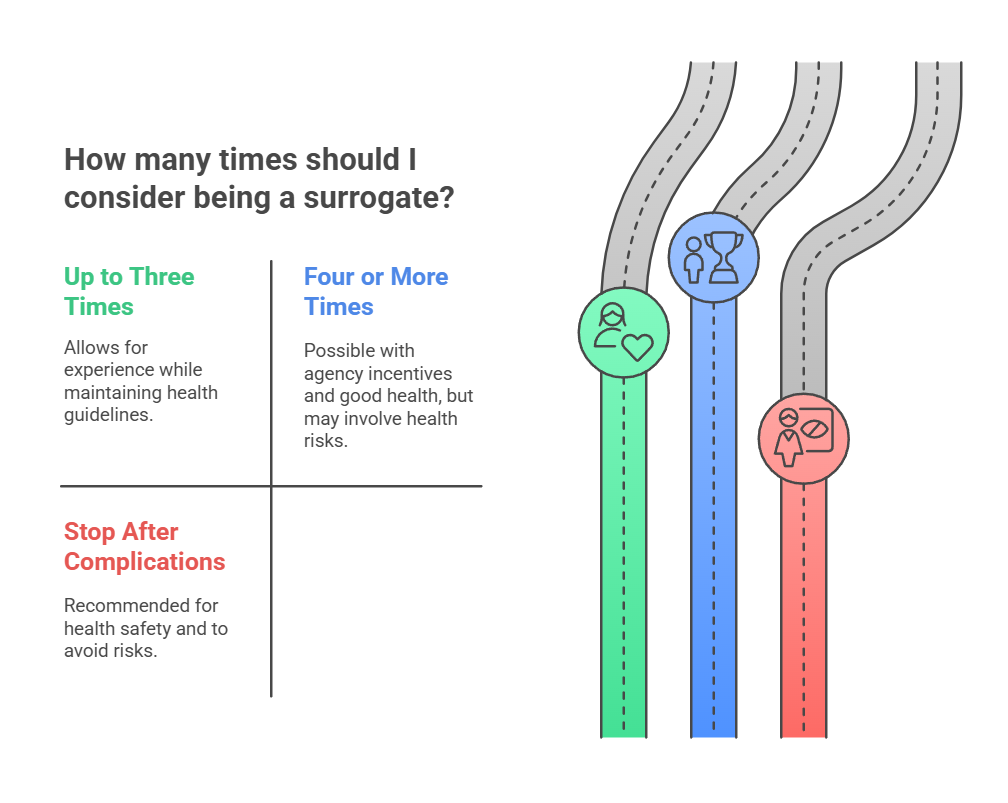
VII. Conclusion
Becoming a surrogate is a meaningful and life-changing decision, and many women choose to do it multiple times. However, there are important medical, emotional, legal, and financial factors to consider.
Key Takeaways:
- Most surrogacy guidelines recommend no more than five vaginal births or three C-sections.
- Each journey requires thorough medical and psychological screening.
- Repeat surrogates often receive higher compensation and agency preference.
- Surrogacy is a significant time and emotional commitment, requiring strong support from family and professionals.
If you are considering becoming a repeat surrogate, consult with a surrogacy agency and a fertility specialist to ensure it is a safe and positive decision for you.




